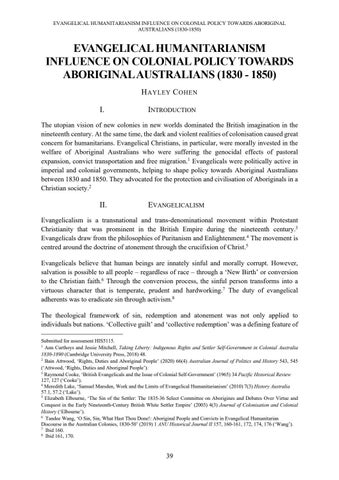EVANGELICAL HUMANITARIANISM INFLUENCE ON COLONIAL POLICY TOWARDS ABORIGINAL AUSTRALIANS (1830-1850)
EVANGELICAL HUMANITARIANISM INFLUENCE ON COLONIAL POLICY TOWARDS ABORIGINAL AUSTRALIANS (1830 - 1850) H AYLEY C OHEN I.
INTRODUCTION
The utopian vision of new colonies in new worlds dominated the British imagination in the nineteenth century. At the same time, the dark and violent realities of colonisation caused great concern for humanitarians. Evangelical Christians, in particular, were morally invested in the welfare of Aboriginal Australians who were suffering the genocidal effects of pastoral expansion, convict transportation and free migration.1 Evangelicals were politically active in imperial and colonial governments, helping to shape policy towards Aboriginal Australians between 1830 and 1850. They advocated for the protection and civilisation of Aboriginals in a Christian society.2
II.
EVANGELICALISM
Evangelicalism is a transnational and trans-denominational movement within Protestant Christianity that was prominent in the British Empire during the nineteenth century.3 Evangelicals draw from the philosophies of Puritanism and Enlightenment.4 The movement is centred around the doctrine of atonement through the crucifixion of Christ.5 Evangelicals believe that human beings are innately sinful and morally corrupt. However, salvation is possible to all people – regardless of race – through a ‘New Birth’ or conversion to the Christian faith.6 Through the conversion process, the sinful person transforms into a virtuous character that is temperate, prudent and hardworking.7 The duty of evangelical adherents was to eradicate sin through activism.8 The theological framework of sin, redemption and atonement was not only applied to individuals but nations. ‘Collective guilt’ and ‘collective redemption’ was a defining feature of Submitted for assessment HIS5115. 1 Ann Curthoys and Jessie Mitchell, Taking Liberty: Indigenous Rights and Settler Self-Government in Colonial Australia 1830-1890 (Cambridge University Press, 2018) 48. 2 Bain Attwood, ‘Rights, Duties and Aboriginal People’ (2020) 66(4) Australian Journal of Politics and History 543, 545 (‘Attwood, ‘Rights, Duties and Aboriginal People’). 3 Raymond Cooke, ‘British Evangelicals and the Issue of Colonial Self-Government’ (1965) 34 Pacific Historical Review 127, 127 (‘Cooke’). 4 Meredith Lake, ‘Samuel Marsden, Work and the Limits of Evangelical Humanitarianism’ (2010) 7(3) History Australia 57.1, 57.2 (‘Lake’). 5 Elizabeth Elbourne, ‘The Sin of the Settler: The 1835-36 Select Committee on Aborigines and Debates Over Virtue and Conquest in the Early Nineteenth-Century British White Settler Empire’ (2003) 4(3) Journal of Colonisation and Colonial History (‘Elbourne’). 6 Tandee Wang, ‘O Sin, Sin, What Hast Thou Done!: Aboriginal People and Convicts in Evangelical Humanitarian Discourse in the Australian Colonies, 1830-50’ (2019) 1 ANU Historical Journal II 157, 160-161, 172, 174, 176 (‘Wang’). 7 Ibid 160. 8 Ibid 161, 170.
39
